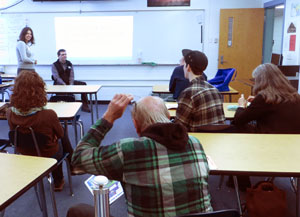 This past Saturday at the ACORN Sustainable Living Expo, I presented with Michael Wood-Lewis, co-founder of Front Porch Forum, on the question of how technology interacts with community to create sustainability. The discussion was rich with concepts and thoughts, and our attendees presented us with a number of inputs and opinions as well, which I wanted to share with those of you who were unable to attend.
This past Saturday at the ACORN Sustainable Living Expo, I presented with Michael Wood-Lewis, co-founder of Front Porch Forum, on the question of how technology interacts with community to create sustainability. The discussion was rich with concepts and thoughts, and our attendees presented us with a number of inputs and opinions as well, which I wanted to share with those of you who were unable to attend.
Our discussion focused around a number of different layers in which technology can help reduce a person’s carbon footprint, or move a community to action.
On the most basic level, technology itself has created “greener” ways to interact in our world. From LED light bulbs to email, technology is constantly evolving to increase its own sustainability. In fact, one study found that when researchers followed the entire life cycle of an invoice, using electronic invoicing instead of paper-based invoicing decreased the process’ carbon footprint by 63%.
But these methods rely on an individual’s imperative. For example, if you want to make a conscious effort to decrease the carbon footprint of your commute, you can bike to work instead of driving, or you can find somebody to car pool with, but either way it’s an individual choice. Technology can also help you connect your decisions to a larger group of people interested in the same topics or areas that you are. For instance, in terms of car sharing, instead of being limited to the neighbors you might know or see in the street, you could put out a call to friends on Facebook, or on Front Porch Forum. Or, you could check the State of Vermont’s Car-Sharing App to see if anyone has a commute that is similar to yours.
This concept of community building, with technology as a means of “fertilizing the soil” of community organizing, as Michael Wood-Lewis would say, is what Front Porch Forum is aiming to do on a local level. “We created Front Porch Forum to help neighbors connect with each other,” said Michael. “I might know a neighbor only by his political bumper sticker. But when I read his FPF postings about lost pets, pitching in to help a neighbor in the hospital, or borrowing a canoe for a special outing with a grandchild, it changes my perception of him and gives him a human face.” Front Porch Forum is about using technologies to connect people who might not otherwise have a lot in common aside from location. Once those connections are made, community organizing around whatever activism, be it environmental or otherwise, becomes that much easier.
There are other tools for community building as well, some of which are also based around location. For example, Meetup allows folks to connect around issues or topics online, and then, as the name suggests, meet up to actually do what people had discussed, whether it’s a hike, a karaoke night, or the formation of an environmental action group.
Online organizations that make sustainability into a collaboration or a competition are also gaining ground. For example, ACORN’s keynote speaker was Kathryn Blume, co-founder of Vermontivate, a month-long competition in which participants earn points for various “green” challenges. The winning group then earns a free Ben and Jerry’s ice cream party, and competition has been fun and fierce.
But these communities can span far beyond local areas. For instance, through standard forms of social media, you can follow a twitter hashtag (such as #nptech, which is all about technology in the nonprofit world) or you can follow an Instagram hashtag, like #litterati, a campaign that grew out of taking a photo of litter before picking it up and posting the photo on Instagram. To date, the literati campaign has logged over 40,000 pieces of trash that were picked up.
Finally, technology can make broader societal changes by addressing the ease with which people can have access to and understand data. This relates to the “Internet of Things” which is how items within world can interact with each other. For instance, a smart thermostat such as Nest learns your habits and adjusts your home’s temperature accordingly – you don’t need to set a timer.
This larger data also relates to a trend towards open data. Technology allows for much data aggregation, and if that data is open for the public to see and play with, new ways of assessing information can be formed. A great example of this is in Oakland, where the city’s “Open Budget Oakland” campaign allows anybody to see the city’s budget through a series of colorful boxes, making it much easier to understand.
Overall, technology is not the end-all be-all of sustainability; but it is a tool that can be used to effectively create larger amounts of communication and collaboration, and clearer sets of information, all of which can help to address the larger issues of sustainability and community.
